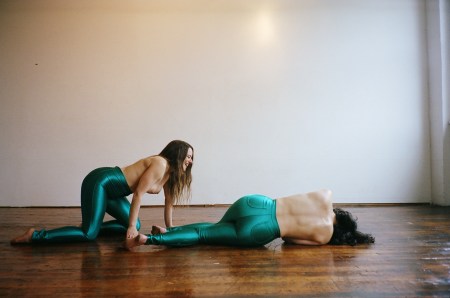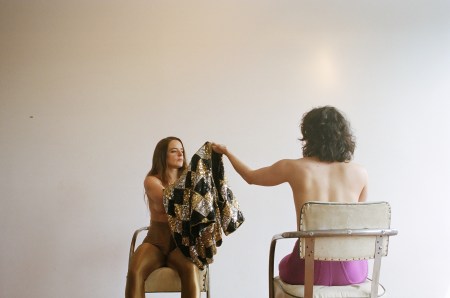ALLIE HANKINSAhead of her performance at Cork's Quarter Block Party this year, writer and theatre maker Dylan Coburn Gray spoke to Portland-based artist Allie Hankins about her show Now Then: A Prologue. In her work, Allie likes to fuck around with persona through performances that mix the physical and the verbal.
|
|
Dylan: So, you’re Allie Hankins and you’re doing your show as part of Quarter.
Allie: I am. D: And I was just looking at the copy there...em… and one of the things that jumped out was the fact that, not only do you have an all-female production team, but I know you have an all-female production team - because they’re in the copy. So that’s something that’s important to you as an artist? A: Em, it was, it is in general, surely. And then this particular piece, eh, it’s only maybe the third piece that I’ve produced by myself and in the past I, had sort of, um, I ended up working with a lot of male collaborators and for this particular show, given the content, I just found it was really important to me to align myself with other female-identified artists in my field and to work with them and to come together, uh, with this like sort of base understanding of what it’s like inside of this particular community to be identified as female and sort of work towards this production together. D: And you’re saying that in the context of this show – obviously it’s a general thing, but for this show in particular it was important . A: I felt so because it deals… it’s something… it’s maybe the closest thing to an autobiographical work that I’ve made and so it’s about me and my experiences with my sexuality as, like, a female-identified person and so I felt it was important to have a group of allies in the room that, maybe, and maybe not, but maybe have a similar experience. Or can be a bit more empathetic to my experience or something like this.
D: Totally, because one of the other things I had kind of jotted down from your copy is the idea of lust – whose lust? And I suppose in a sense that’s kind of an answer because obviously as a bodily experience it’s kind of different depending on who you’re talking about and in what kind of social context they’re operating. A: Yeah, yeah. D: And also there’s a thing there about stripping the body of its poetic nature – would you like to talk about that a little maybe? A: Sure yeah – so I think it goes a bit… it’s a bit in line with this idea of lust and I think I was approaching these ideas from a social standpoint, the idea of dating and having sex with other people, but also the, um, uh, the act of performing itself, so like being a solo woman on stage and the sort of exchange that happens between the audience and the performer and how I’m able to hold a lot as the performer on stage and how there’s this sort of preciousness that is somehow or sometimes built into the experience of an audience watching, maybe especially a woman performer onstage, and I wanted to sort of toy with this idea or at least experiment for myself with this idea of how can I rupture this idea of preciousness or this idea of the sort of sacred image or persona on stage, how can I sort of make it a bit more sort of porous and have these surprising elements of just a bit more… yeah, just a bit more of a prosaic nature where things are very sort of pedestrian and transparent and open and there’s like a sort of breaking in the… of course in the fourth wall obviously, which is not uncommon anymore, but in like, em, sort of engaging the audience in a new way for myself, I suppose. <
|
A: Yeah, especially the venue where I’ll be performing in Cork is a pub so there’s already something less inherently poetic about it because it’s not in a theatre, like, there’s that not that built-in sort of distance between audience and performer but there’ll be a lot of, like, me sort of infiltrating where the audience will be sitting, and there will be a bit more of a tension between, like, proximity and, like, how close are you, quote, allowed to get to the performer and what is the performer allowed to do to you or with you during a performance, I think.
<
|
|
Now Then: A Prologue is presented as part of Quarter Block Party on Saturday 4th February 2017.
Images from When We by Ashley Sophie Clark |

